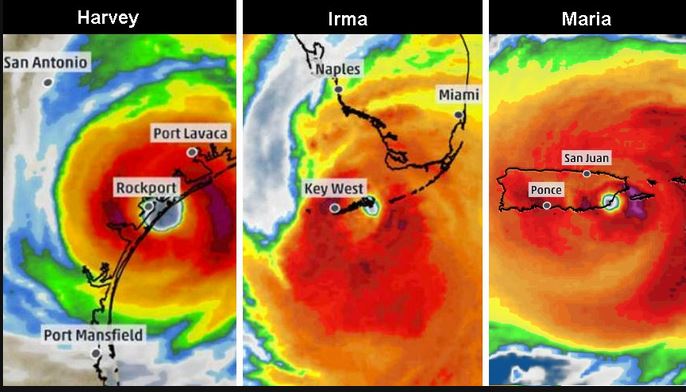
As Hurricane Maria hits region, the Antigua & Barbuda Prime Minister says: “We are the victims of climate change”
There is rising anger in the Caribbean about hurricanes and climate change
As new Hurricane Maria brings devastation to Puerto Rico, the governor of the island, Ricardo Rossello, has asked Donald Trump to declare the US territory a disaster zone.
He has said that Maria could be the most damaging Hurricane to hit the country in over one hundred years.
With maximum recorded wind speeds of 140mph and rainfall of up to 25 inches or even higher, Mike Brennan, a senior hurricane specialist from the US National Hurricane Center has also warned locals of flash-flooding and “punishing” rainfall. He added that the storm would remain “very dangerous” for the next couple of days.
“Rainfall is going to continue to be a problem there even after Maria’s center begins to move away,” Brennan said. “Everybody there should be prepared to stay safe the rest of the day and into tomorrow morning”.
In nearby Dominica, the Principal Advisor to Prime Minister Roosevelt Skerrit, said “The island has been devastated. The housing stock significantly damaged or destroyed … The country is in a daze – no electricity, no running water – as a result of uprooted pipes in most communities and definitely to landline or cellphone services on island, and that will be for quite a while.”
As Maria follows on after Hurricanes Irma and Harvey, there is rising anger in the Caribbean about hurricanes and climate change.
There is noone left on the Antigua and Barbuda islands after previous Hurricane Irma effectively destroyed the island’s infrastructure and housing with 185-mph winds. All the inhabitants had to be evacuated.
The islands’ Prime Minister, Gaston Browne, told IPS on his way to the 72nd UN General Assembly in New York. “Climate change is real. We are the victims of climate change because of the profligacy in the use of fossil fuels by the large industrialized nations.”
He added: “These nations, that have contributed to global warming and sea level rise, have an obligation to assist in the rebuilding of these islands …Our common humanity, as citizens of a common space, called planet earth mandates a spirit of empathy and cooperation among all nations, large and small.”
The climate deniers in the Trump Administration though don’t want to talk about climate change or how our changing climate is making hurricanes more powerful.
Last week, Donald Trump said: “We’ve had bigger storms than this. And if you go back into the 1930s and the 1940s and you take a look we’ve had storms over the years that have been bigger than this.”
The EPA Administrator Scott “Polluting” Pruitt added “Now isn’t the time to talk about climate change.”
But now is the time to talk about climate change. It certainly looks like our changing climate is playing a part, as 2017 looks set to be an unprecedented hurricane season.
According to the meteorologist Eric Holthaus, who tweeted:
Just one other year in recorded history has there been two U.S. Cat 4+ landfalls (1992, Andrew & Iniki). There's been three in 2017 (so far) https://t.co/HSGfAk9dN1
— Eric Holthaus (@EricHolthaus) September 20, 2017
There is still uncertainty if Maria will hit the US coastline, but if it does, history will be made. And we are only in September.
The Washington Post’s Chris Mooney wrote an article today, entitled: “What’s scary about 2017’s hurricanes isn’t just their strength. It’s how fast they’re achieving it.”
According to Mooney: “Rapid strengthening tends to happen when waters are warm, when that warm water is deep, when the atmosphere is moist and when there’s little adverse wind flow that could disrupt the storm, according to research papers on the topic and interviews with experts.”
And our changing climate is warming the waters and adding more moisture to the atmosphere.
So now is the time to talk about climate change. Pure and simple.

